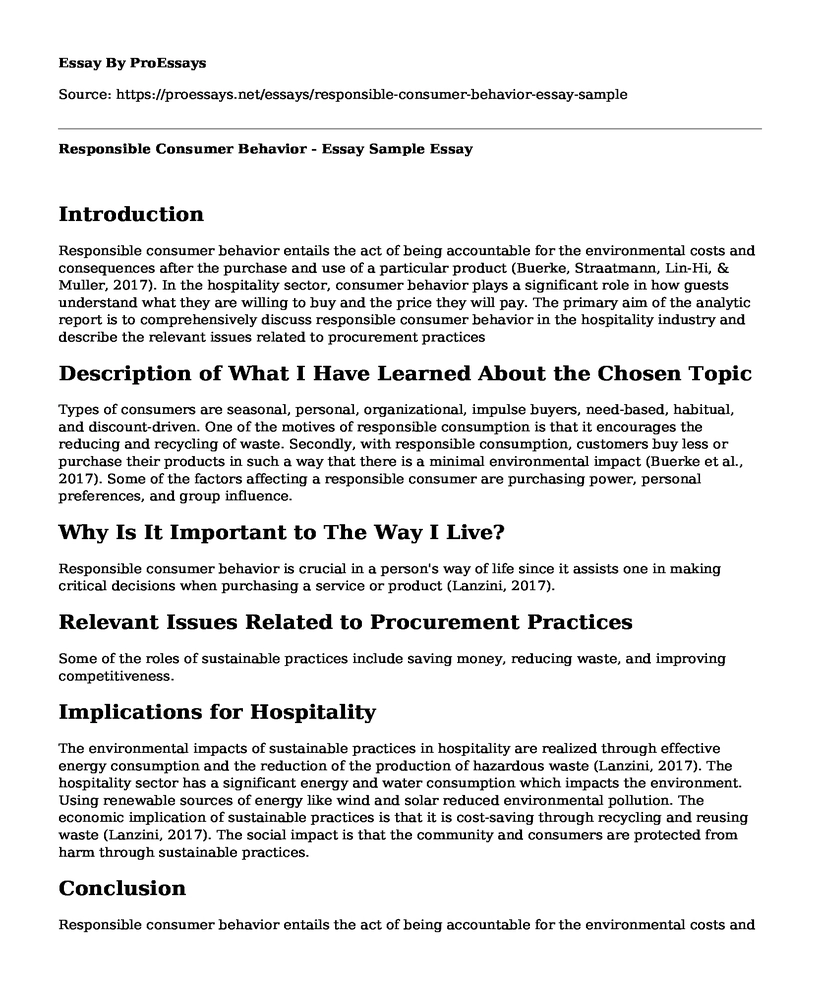Introduction
Responsible consumer behavior entails the act of being accountable for the environmental costs and consequences after the purchase and use of a particular product (Buerke, Straatmann, Lin-Hi, & Muller, 2017). In the hospitality sector, consumer behavior plays a significant role in how guests understand what they are willing to buy and the price they will pay. The primary aim of the analytic report is to comprehensively discuss responsible consumer behavior in the hospitality industry and describe the relevant issues related to procurement practices
Description of What I Have Learned About the Chosen Topic
Types of consumers are seasonal, personal, organizational, impulse buyers, need-based, habitual, and discount-driven. One of the motives of responsible consumption is that it encourages the reducing and recycling of waste. Secondly, with responsible consumption, customers buy less or purchase their products in such a way that there is a minimal environmental impact (Buerke et al., 2017). Some of the factors affecting a responsible consumer are purchasing power, personal preferences, and group influence.
Why Is It Important to The Way I Live?
Responsible consumer behavior is crucial in a person's way of life since it assists one in making critical decisions when purchasing a service or product (Lanzini, 2017).
Relevant Issues Related to Procurement Practices
Some of the roles of sustainable practices include saving money, reducing waste, and improving competitiveness.
Implications for Hospitality
The environmental impacts of sustainable practices in hospitality are realized through effective energy consumption and the reduction of the production of hazardous waste (Lanzini, 2017). The hospitality sector has a significant energy and water consumption which impacts the environment. Using renewable sources of energy like wind and solar reduced environmental pollution. The economic implication of sustainable practices is that it is cost-saving through recycling and reusing waste (Lanzini, 2017). The social impact is that the community and consumers are protected from harm through sustainable practices.
Conclusion
Responsible consumer behavior entails the act of being accountable for the environmental costs and consequences after the purchase and use of a particular product. Types of consumers are seasonal, personal, organizational, impulse buyers, need-based, habitual, and discount-driven. One of the motives of responsible consumption is that it encourages the reducing and recycling of waste. Sustainable practices in hospitality have social, economic, and environmental implications.
References
Buerke, A., Straatmann, T., Lin-Hi, N., & Muller, K. (2017). Consumer awareness and sustainability-focused value orientation as motivating factors of responsible consumer behavior. Review of Managerial Science, 11(4), 959-991.
Lanzini, P. (2017). Responsible Citizens and Sustainable Consumer Behavior: New Interpretive Frameworks. Routledge.
Cite this page
Responsible Consumer Behavior - Essay Sample. (2023, Feb 16). Retrieved from https://proessays.net/essays/responsible-consumer-behavior-essay-sample
If you are the original author of this essay and no longer wish to have it published on the ProEssays website, please click below to request its removal:
- Relevance for Semiotics for Contemporary Design Essay
- Evaluation System in International Development Cooperation Paper Example
- Studio Zero Case Study Paper Example
- Ethno-Semiotics: A Tool for Effective International Advertising - Essay Sample
- Essay on Green Products and Consumer Behavior: Understanding Recent Trends in the Marketplace
- Essay Example on Mobile SEO: Enhancing Consumer Experience on Mobile Devices
- Paper Sample on Consumer Protection in E-Commerce: Return & Refund Policies







